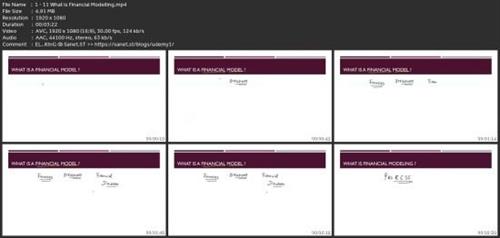- Thread Starter
- #1
Financial Modeling Course by Aheadminds Course

What you'll learn
Comprehensive Curriculum: Covers all types of financial models including valuation models, LBO models, M&A models, and more.
Excel-Based Training: Learn advanced Excel techniques like dynamic charts, macros, and data visualization.
A basic understanding of financial statements (Income Statement, Balance Sheet, Cash Flow Statement)
Financial Analyst: Perform detailed financial analysis and create predictive models for investment and corporate strategy.
Requirements
A basic understanding of financial statements (Income Statement, Balance Sheet, Cash Flow Statement)
Proficiency in Microsoft Excel (intermediate to advanced level)
Background in finance, accounting, or business (preferable but not mandatory)
Willingness to learn data analysis and visualization skills
Familiarity with financial terms and ratios is beneficial
Description
OverviewIn the fast-paced world of finance and business, the ability to develop and utilize financial models is an essential skill for making informed decisions. The Financial Modeling online course offers learners a comprehensive understanding of how to build and apply financial models to analyze performance, predict future trends, and support strategic decision-making. This course provides practical, hands-on experience for anyone looking to strengthen their financial analysis skills.The course covers a wide range of financial models that are commonly used in various business contexts. These include models for valuation, budgeting, forecasting, and mergers and acquisitions. The focus is on Excel-based modeling, a widely-used tool in the financial industry. Learners will follow a structured, step-by-step approach to building models from scratch, working with real-world data to simulate business scenarios. By mastering these techniques, learners will be better equipped to evaluate financial data, identify patterns, and forecast outcomes, all of which are critical for making sound financial decisions.What sets this course apart is its emphasis on practical application. Throughout the lessons, participants will gain hands-on experience in building and refining financial models, ensuring they can confidently apply these skills in real-life business settings. The course guides learners through key concepts such as analyzing historical financial data, developing dynamic financial models, and preparing detailed reports that aid in business decision-making. By using Excel, learners will gain proficiency in one of the most important tools in the financial industry.By the end of the course, participants will have the knowledge and skills to create robust financial models tailored to the needs of various businesses and industries. These models can help evaluate past performance, assess risks, and forecast future outcomes, providing a clear picture of a company's financial health and guiding critical business decisions.The skills gained from this course are applicable across a range of sectors, from finance and banking to corporate management and entrepreneurship. Whether you're aiming to deepen your understanding of financial modeling or seeking practical tools to apply in your professional role, this course will help you build a strong foundation in financial modeling that can be used in numerous business contexts.This course focuses on delivering practical insights and tools to help learners understand and implement financial models that are widely used in businesses worldwide.
Overview
Section 1: Introduction
Lecture 1 1.1. What is Financial Modelling
Lecture 2 1.2. Who uses Financial Modelling
Lecture 3 1.3. Overview and Application of Financial Modelling
Lecture 4 1.4. Excel Uses in Financial Modelling
Lecture 5 1.5. Work on Excel in Financial Modelling
Lecture 6 1.6. Call Referencing Vs Call Freezing
Lecture 7 1.7. Call Referencing Vs Call Freezing
Lecture 8 1.8. Cases
Lecture 9 1.9. Cases2
Lecture 10 1.10. Cases3
Lecture 11 1.11. DataBase in Excel
Business and Finance Students,Aspiring Financial Analysts,Entrepreneurs and Business Owners,Finance Professionals looking to upskill,Investment Bankers and Equity Analysts,Chartered Accountants and CPAs,Management Consultants,Engineers with interest in finance and business strategy,Any professional involved in financial decision-making

Say "Thank You"
rapidgator.net:
ddownload.com:

Published 10/2024
MP4 | Video: h264, 1920x1080 | Audio: AAC, 44.1 KHz
Language: English | Size: 903.94 MB | Duration: 2h 25m
Build Dynamic Models for Valuation, Forecasting, and Strategic Decision-Making
MP4 | Video: h264, 1920x1080 | Audio: AAC, 44.1 KHz
Language: English | Size: 903.94 MB | Duration: 2h 25m
Build Dynamic Models for Valuation, Forecasting, and Strategic Decision-Making
What you'll learn
Comprehensive Curriculum: Covers all types of financial models including valuation models, LBO models, M&A models, and more.
Excel-Based Training: Learn advanced Excel techniques like dynamic charts, macros, and data visualization.
A basic understanding of financial statements (Income Statement, Balance Sheet, Cash Flow Statement)
Financial Analyst: Perform detailed financial analysis and create predictive models for investment and corporate strategy.
Requirements
A basic understanding of financial statements (Income Statement, Balance Sheet, Cash Flow Statement)
Proficiency in Microsoft Excel (intermediate to advanced level)
Background in finance, accounting, or business (preferable but not mandatory)
Willingness to learn data analysis and visualization skills
Familiarity with financial terms and ratios is beneficial
Description
OverviewIn the fast-paced world of finance and business, the ability to develop and utilize financial models is an essential skill for making informed decisions. The Financial Modeling online course offers learners a comprehensive understanding of how to build and apply financial models to analyze performance, predict future trends, and support strategic decision-making. This course provides practical, hands-on experience for anyone looking to strengthen their financial analysis skills.The course covers a wide range of financial models that are commonly used in various business contexts. These include models for valuation, budgeting, forecasting, and mergers and acquisitions. The focus is on Excel-based modeling, a widely-used tool in the financial industry. Learners will follow a structured, step-by-step approach to building models from scratch, working with real-world data to simulate business scenarios. By mastering these techniques, learners will be better equipped to evaluate financial data, identify patterns, and forecast outcomes, all of which are critical for making sound financial decisions.What sets this course apart is its emphasis on practical application. Throughout the lessons, participants will gain hands-on experience in building and refining financial models, ensuring they can confidently apply these skills in real-life business settings. The course guides learners through key concepts such as analyzing historical financial data, developing dynamic financial models, and preparing detailed reports that aid in business decision-making. By using Excel, learners will gain proficiency in one of the most important tools in the financial industry.By the end of the course, participants will have the knowledge and skills to create robust financial models tailored to the needs of various businesses and industries. These models can help evaluate past performance, assess risks, and forecast future outcomes, providing a clear picture of a company's financial health and guiding critical business decisions.The skills gained from this course are applicable across a range of sectors, from finance and banking to corporate management and entrepreneurship. Whether you're aiming to deepen your understanding of financial modeling or seeking practical tools to apply in your professional role, this course will help you build a strong foundation in financial modeling that can be used in numerous business contexts.This course focuses on delivering practical insights and tools to help learners understand and implement financial models that are widely used in businesses worldwide.
Overview
Section 1: Introduction
Lecture 1 1.1. What is Financial Modelling
Lecture 2 1.2. Who uses Financial Modelling
Lecture 3 1.3. Overview and Application of Financial Modelling
Lecture 4 1.4. Excel Uses in Financial Modelling
Lecture 5 1.5. Work on Excel in Financial Modelling
Lecture 6 1.6. Call Referencing Vs Call Freezing
Lecture 7 1.7. Call Referencing Vs Call Freezing
Lecture 8 1.8. Cases
Lecture 9 1.9. Cases2
Lecture 10 1.10. Cases3
Lecture 11 1.11. DataBase in Excel
Business and Finance Students,Aspiring Financial Analysts,Entrepreneurs and Business Owners,Finance Professionals looking to upskill,Investment Bankers and Equity Analysts,Chartered Accountants and CPAs,Management Consultants,Engineers with interest in finance and business strategy,Any professional involved in financial decision-making
Screenshots

Say "Thank You"
rapidgator.net:
You must reply in thread to view hidden text.
ddownload.com:
You must reply in thread to view hidden text.
